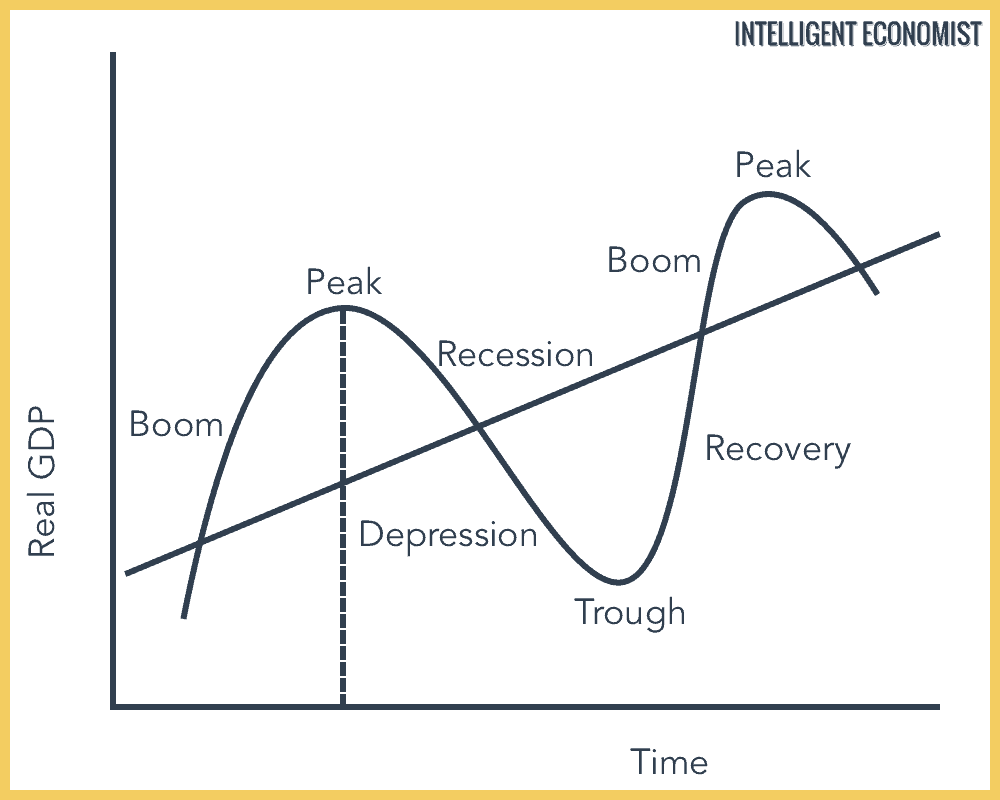The Concept of Business Cycles
Business cycles represent the natural change of economic development stages that reflect the external environment influencing a company’s activities. In this case, a cycle consists of several periods: expansion, peak, recession, depression, trough, and recovery. These events can be easily traced on the example of a single company as well as a country’s economy as a whole. There is no frequency of the stages mentioned above, and this fact defines the necessity to reconsider and reevaluate the correspondence of one’s business operations to the economic situation on a regular basis.
Such an instrument as the concept of business cycles is extremely vital for analyzing the economy’s current state. It also facilitates the decision-making process for business owners since their primary task is to focus on the slightest shifts in the external environment to keep the profit and increase it over time. In order to do this, they should consider a range of factors, including natural disasters, wars, politics, changes in population, and many others. Hence, the proper use of knowledge on business cycles defines the success of one’s business.
The primary reason why these cycles are essential is in the inevitability of their change. Therefore, failure to recognize the current stage would result in bankruptcy as a company might not have enough time to readjust its activities in accordance with newly emerging circumstances. Some economists claim that this process is significantly influenced by the policies of central banks. Nevertheless, this fact does not change the necessity for a business owner to keep up with the current economic tendencies. In this case, the capability of a company to adapt to them in a timely manner matters.
Cafe Rouge and Bella Italia
The easiest way to notice the shifts from one stage of business cycles to another is to analyze companies’ policies. The experience of Cafe Rouge and Bella Italia, in this case, demonstrates the influence of external circumstances on the change. The owner of these restaurant chains, the Casual Dining Group, closes the outlets as a response to the current crisis caused by the spread of coronavirus infection (Mahmood 2020). It allows concluding on the beginning of the stage of depression as the company started to have difficulties (Mahmood 2020). They led to the necessity to protect the business by taking such drastic measures.
From the Casual Dining Group’s experience, it can be seen why the change of business cycles is not regular. The external circumstances, such as the pandemic, cannot be predicted in order to prevent businesses from losses. The current cycle of the company does not matter when it comes to the rapidly changing environment. Being either on the peak or in the process of recovery, any business will return to recession and, consequently, depression, if the situation does not change. In this way, these restaurants prove that the previous period of prosperity does not indicate an organization’s capability to avoid losses.
According to the concept, the following change in the environment will lead to a more advantageous stage. Therefore, the perspectives of the Casual Dining Group correspond to the model (see the Business Cycle Graph). Its further development will reflect the change in the situation in the world. From the stage of depression, the company will transition to trough, which, in turn, will shift to recovery and, consequently, to peak once the crisis is over. In this way, the Casual Dining Group’s experience supports the ongoing processes within the model of business cycles.
The Business Cycle Graph

References
Agarwal, Prateek. 2020. “Business Cycle.” Intelligent Economist, Web.
Mahmood, Basit. 2020. “Cafe Rouge and Bella Italia Owner to Close Over 1/3rd of Outlets.” Newsweek, Web.